Hospitality Communication Interview Report: Challenges and Strategies
VerifiedAdded on 2021/06/17
|10
|1896
|198
Report
AI Summary
This report presents an analysis of an interview conducted with the assistant manager of "The Luxurious" restaurant, focusing on the challenges and strategies related to interpersonal communication within the hospitality industry. The interview explored the impact of cultural differences on communication between management and employees, highlighting the need for effective non-verbal communication, including body language, empathy, and voice modulation, to train a diverse workforce. The report discusses the importance of intercultural skills, cultural sensitivity, and the development of a better working atmosphere. The findings emphasize the significance of understanding job roles, promoting respect, and improving listening skills to enhance customer satisfaction and improve the overall quality of hospitality services. Recommendations include focusing on non-verbal communication, providing hospitality training, and fostering a culture of appreciation and understanding within the workplace.
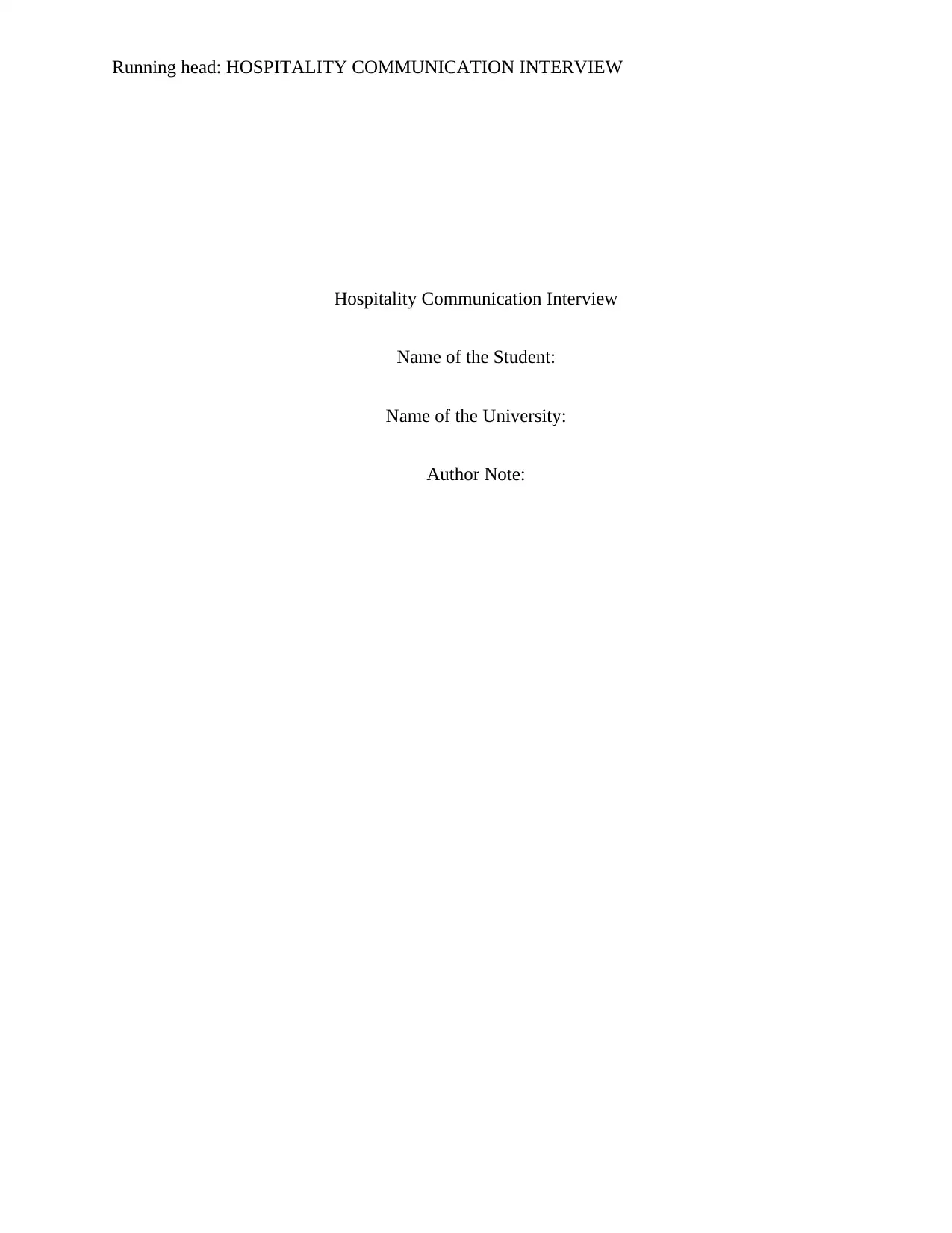
Running head: HOSPITALITY COMMUNICATION INTERVIEW
Hospitality Communication Interview
Name of the Student:
Name of the University:
Author Note:
Hospitality Communication Interview
Name of the Student:
Name of the University:
Author Note:
Paraphrase This Document
Need a fresh take? Get an instant paraphrase of this document with our AI Paraphraser
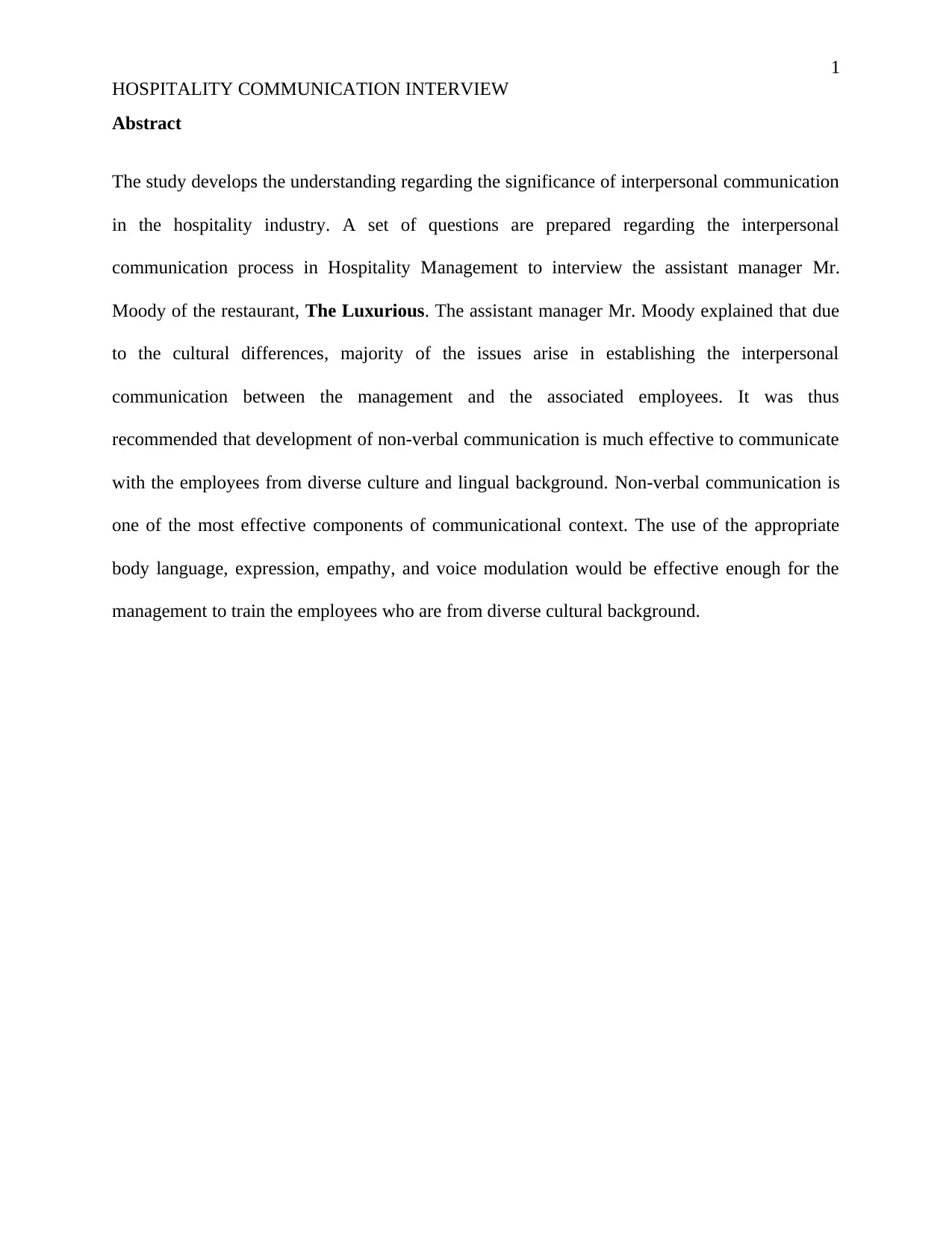
1
HOSPITALITY COMMUNICATION INTERVIEW
Abstract
The study develops the understanding regarding the significance of interpersonal communication
in the hospitality industry. A set of questions are prepared regarding the interpersonal
communication process in Hospitality Management to interview the assistant manager Mr.
Moody of the restaurant, The Luxurious. The assistant manager Mr. Moody explained that due
to the cultural differences, majority of the issues arise in establishing the interpersonal
communication between the management and the associated employees. It was thus
recommended that development of non-verbal communication is much effective to communicate
with the employees from diverse culture and lingual background. Non-verbal communication is
one of the most effective components of communicational context. The use of the appropriate
body language, expression, empathy, and voice modulation would be effective enough for the
management to train the employees who are from diverse cultural background.
HOSPITALITY COMMUNICATION INTERVIEW
Abstract
The study develops the understanding regarding the significance of interpersonal communication
in the hospitality industry. A set of questions are prepared regarding the interpersonal
communication process in Hospitality Management to interview the assistant manager Mr.
Moody of the restaurant, The Luxurious. The assistant manager Mr. Moody explained that due
to the cultural differences, majority of the issues arise in establishing the interpersonal
communication between the management and the associated employees. It was thus
recommended that development of non-verbal communication is much effective to communicate
with the employees from diverse culture and lingual background. Non-verbal communication is
one of the most effective components of communicational context. The use of the appropriate
body language, expression, empathy, and voice modulation would be effective enough for the
management to train the employees who are from diverse cultural background.
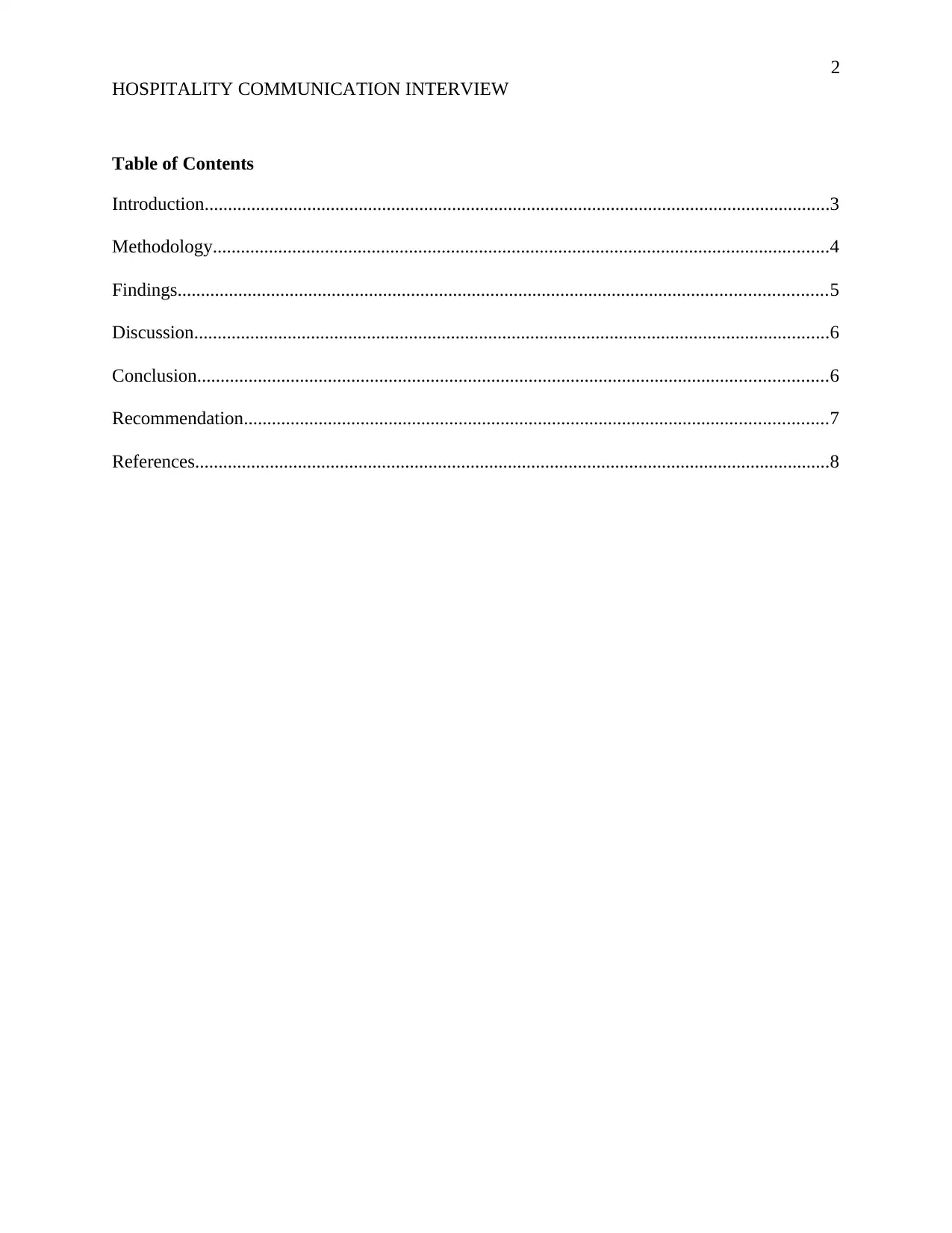
2
HOSPITALITY COMMUNICATION INTERVIEW
Table of Contents
Introduction......................................................................................................................................3
Methodology....................................................................................................................................4
Findings...........................................................................................................................................5
Discussion........................................................................................................................................6
Conclusion.......................................................................................................................................6
Recommendation.............................................................................................................................7
References........................................................................................................................................8
HOSPITALITY COMMUNICATION INTERVIEW
Table of Contents
Introduction......................................................................................................................................3
Methodology....................................................................................................................................4
Findings...........................................................................................................................................5
Discussion........................................................................................................................................6
Conclusion.......................................................................................................................................6
Recommendation.............................................................................................................................7
References........................................................................................................................................8
⊘ This is a preview!⊘
Do you want full access?
Subscribe today to unlock all pages.

Trusted by 1+ million students worldwide
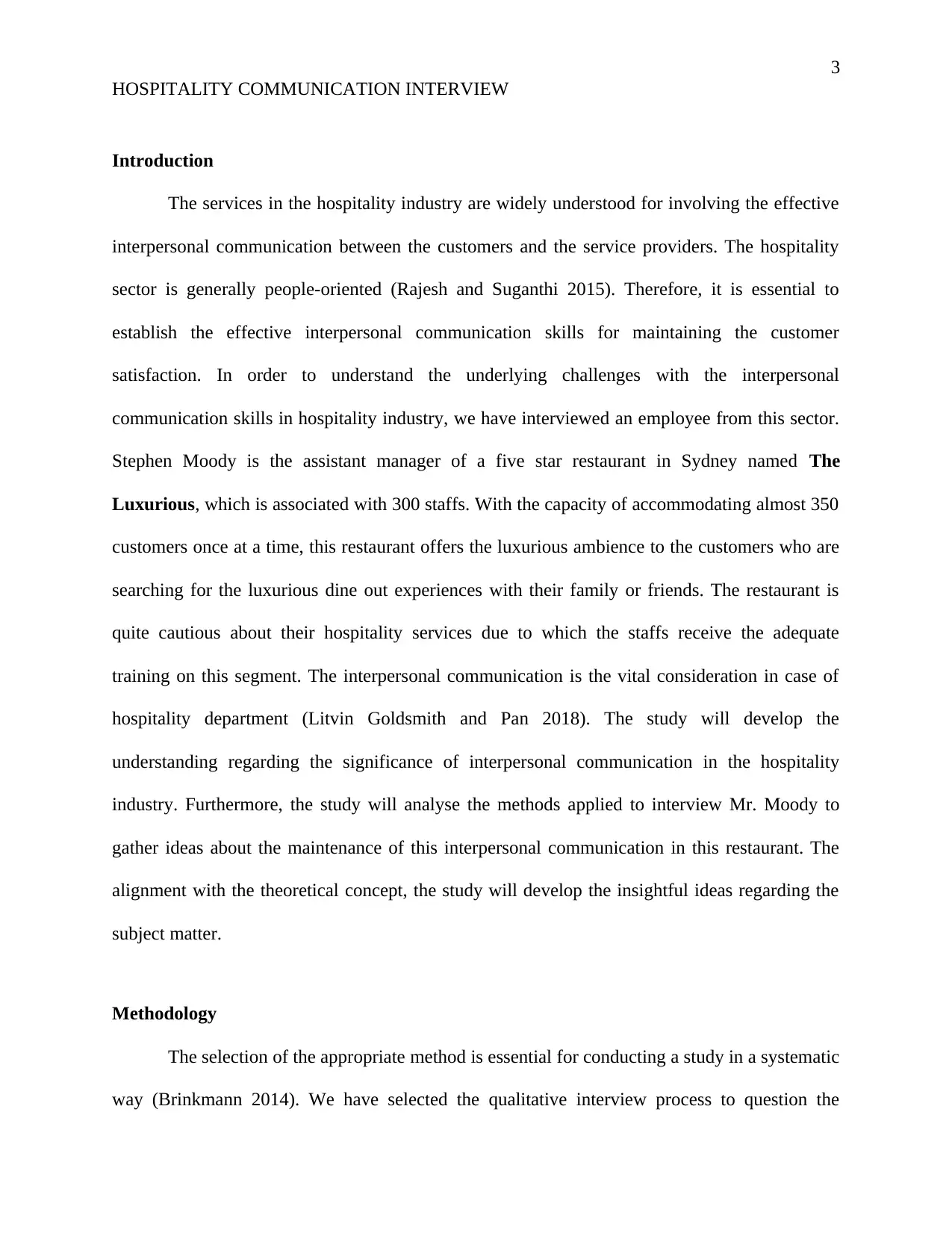
3
HOSPITALITY COMMUNICATION INTERVIEW
Introduction
The services in the hospitality industry are widely understood for involving the effective
interpersonal communication between the customers and the service providers. The hospitality
sector is generally people-oriented (Rajesh and Suganthi 2015). Therefore, it is essential to
establish the effective interpersonal communication skills for maintaining the customer
satisfaction. In order to understand the underlying challenges with the interpersonal
communication skills in hospitality industry, we have interviewed an employee from this sector.
Stephen Moody is the assistant manager of a five star restaurant in Sydney named The
Luxurious, which is associated with 300 staffs. With the capacity of accommodating almost 350
customers once at a time, this restaurant offers the luxurious ambience to the customers who are
searching for the luxurious dine out experiences with their family or friends. The restaurant is
quite cautious about their hospitality services due to which the staffs receive the adequate
training on this segment. The interpersonal communication is the vital consideration in case of
hospitality department (Litvin Goldsmith and Pan 2018). The study will develop the
understanding regarding the significance of interpersonal communication in the hospitality
industry. Furthermore, the study will analyse the methods applied to interview Mr. Moody to
gather ideas about the maintenance of this interpersonal communication in this restaurant. The
alignment with the theoretical concept, the study will develop the insightful ideas regarding the
subject matter.
Methodology
The selection of the appropriate method is essential for conducting a study in a systematic
way (Brinkmann 2014). We have selected the qualitative interview process to question the
HOSPITALITY COMMUNICATION INTERVIEW
Introduction
The services in the hospitality industry are widely understood for involving the effective
interpersonal communication between the customers and the service providers. The hospitality
sector is generally people-oriented (Rajesh and Suganthi 2015). Therefore, it is essential to
establish the effective interpersonal communication skills for maintaining the customer
satisfaction. In order to understand the underlying challenges with the interpersonal
communication skills in hospitality industry, we have interviewed an employee from this sector.
Stephen Moody is the assistant manager of a five star restaurant in Sydney named The
Luxurious, which is associated with 300 staffs. With the capacity of accommodating almost 350
customers once at a time, this restaurant offers the luxurious ambience to the customers who are
searching for the luxurious dine out experiences with their family or friends. The restaurant is
quite cautious about their hospitality services due to which the staffs receive the adequate
training on this segment. The interpersonal communication is the vital consideration in case of
hospitality department (Litvin Goldsmith and Pan 2018). The study will develop the
understanding regarding the significance of interpersonal communication in the hospitality
industry. Furthermore, the study will analyse the methods applied to interview Mr. Moody to
gather ideas about the maintenance of this interpersonal communication in this restaurant. The
alignment with the theoretical concept, the study will develop the insightful ideas regarding the
subject matter.
Methodology
The selection of the appropriate method is essential for conducting a study in a systematic
way (Brinkmann 2014). We have selected the qualitative interview process to question the
Paraphrase This Document
Need a fresh take? Get an instant paraphrase of this document with our AI Paraphraser
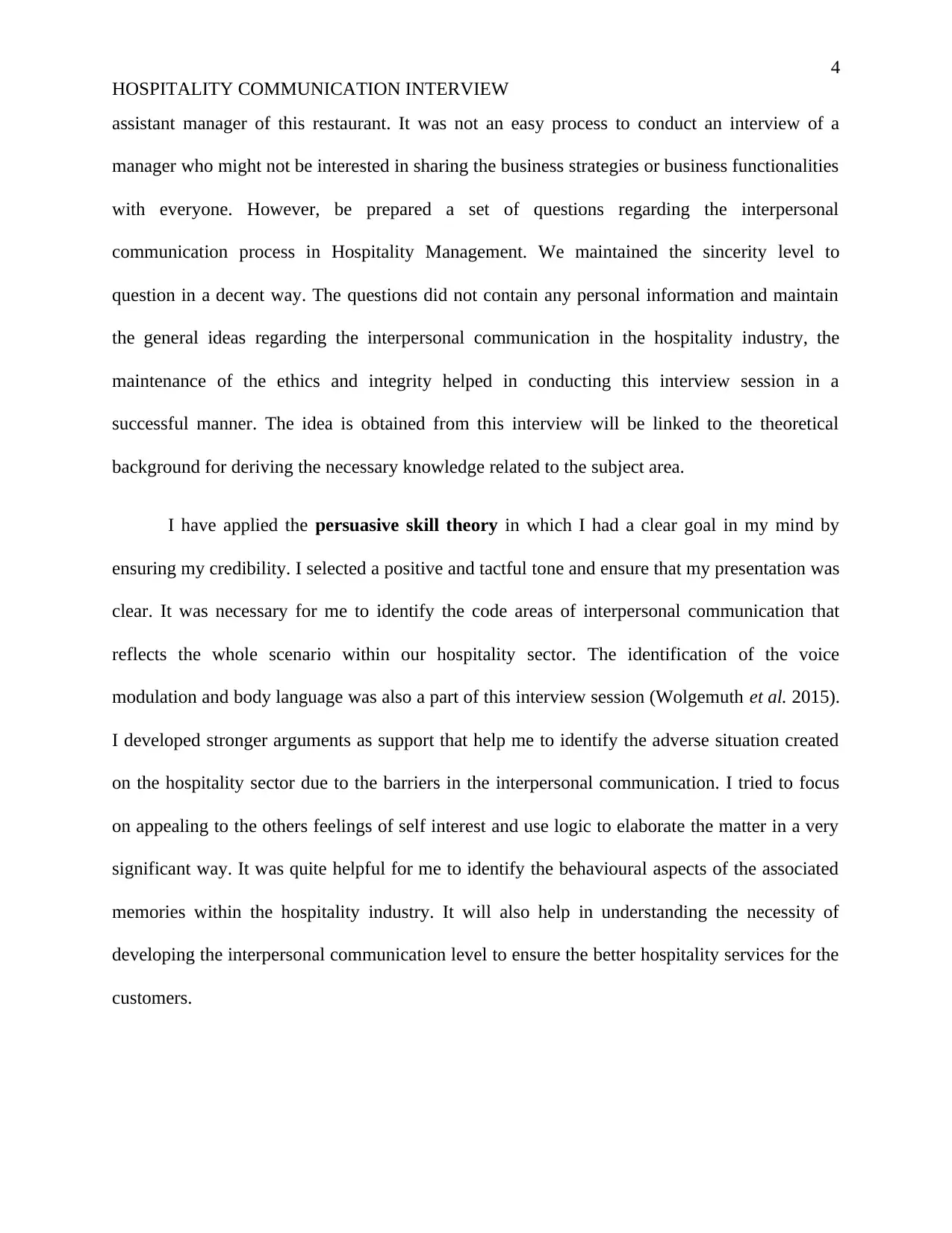
4
HOSPITALITY COMMUNICATION INTERVIEW
assistant manager of this restaurant. It was not an easy process to conduct an interview of a
manager who might not be interested in sharing the business strategies or business functionalities
with everyone. However, be prepared a set of questions regarding the interpersonal
communication process in Hospitality Management. We maintained the sincerity level to
question in a decent way. The questions did not contain any personal information and maintain
the general ideas regarding the interpersonal communication in the hospitality industry, the
maintenance of the ethics and integrity helped in conducting this interview session in a
successful manner. The idea is obtained from this interview will be linked to the theoretical
background for deriving the necessary knowledge related to the subject area.
I have applied the persuasive skill theory in which I had a clear goal in my mind by
ensuring my credibility. I selected a positive and tactful tone and ensure that my presentation was
clear. It was necessary for me to identify the code areas of interpersonal communication that
reflects the whole scenario within our hospitality sector. The identification of the voice
modulation and body language was also a part of this interview session (Wolgemuth et al. 2015).
I developed stronger arguments as support that help me to identify the adverse situation created
on the hospitality sector due to the barriers in the interpersonal communication. I tried to focus
on appealing to the others feelings of self interest and use logic to elaborate the matter in a very
significant way. It was quite helpful for me to identify the behavioural aspects of the associated
memories within the hospitality industry. It will also help in understanding the necessity of
developing the interpersonal communication level to ensure the better hospitality services for the
customers.
HOSPITALITY COMMUNICATION INTERVIEW
assistant manager of this restaurant. It was not an easy process to conduct an interview of a
manager who might not be interested in sharing the business strategies or business functionalities
with everyone. However, be prepared a set of questions regarding the interpersonal
communication process in Hospitality Management. We maintained the sincerity level to
question in a decent way. The questions did not contain any personal information and maintain
the general ideas regarding the interpersonal communication in the hospitality industry, the
maintenance of the ethics and integrity helped in conducting this interview session in a
successful manner. The idea is obtained from this interview will be linked to the theoretical
background for deriving the necessary knowledge related to the subject area.
I have applied the persuasive skill theory in which I had a clear goal in my mind by
ensuring my credibility. I selected a positive and tactful tone and ensure that my presentation was
clear. It was necessary for me to identify the code areas of interpersonal communication that
reflects the whole scenario within our hospitality sector. The identification of the voice
modulation and body language was also a part of this interview session (Wolgemuth et al. 2015).
I developed stronger arguments as support that help me to identify the adverse situation created
on the hospitality sector due to the barriers in the interpersonal communication. I tried to focus
on appealing to the others feelings of self interest and use logic to elaborate the matter in a very
significant way. It was quite helpful for me to identify the behavioural aspects of the associated
memories within the hospitality industry. It will also help in understanding the necessity of
developing the interpersonal communication level to ensure the better hospitality services for the
customers.
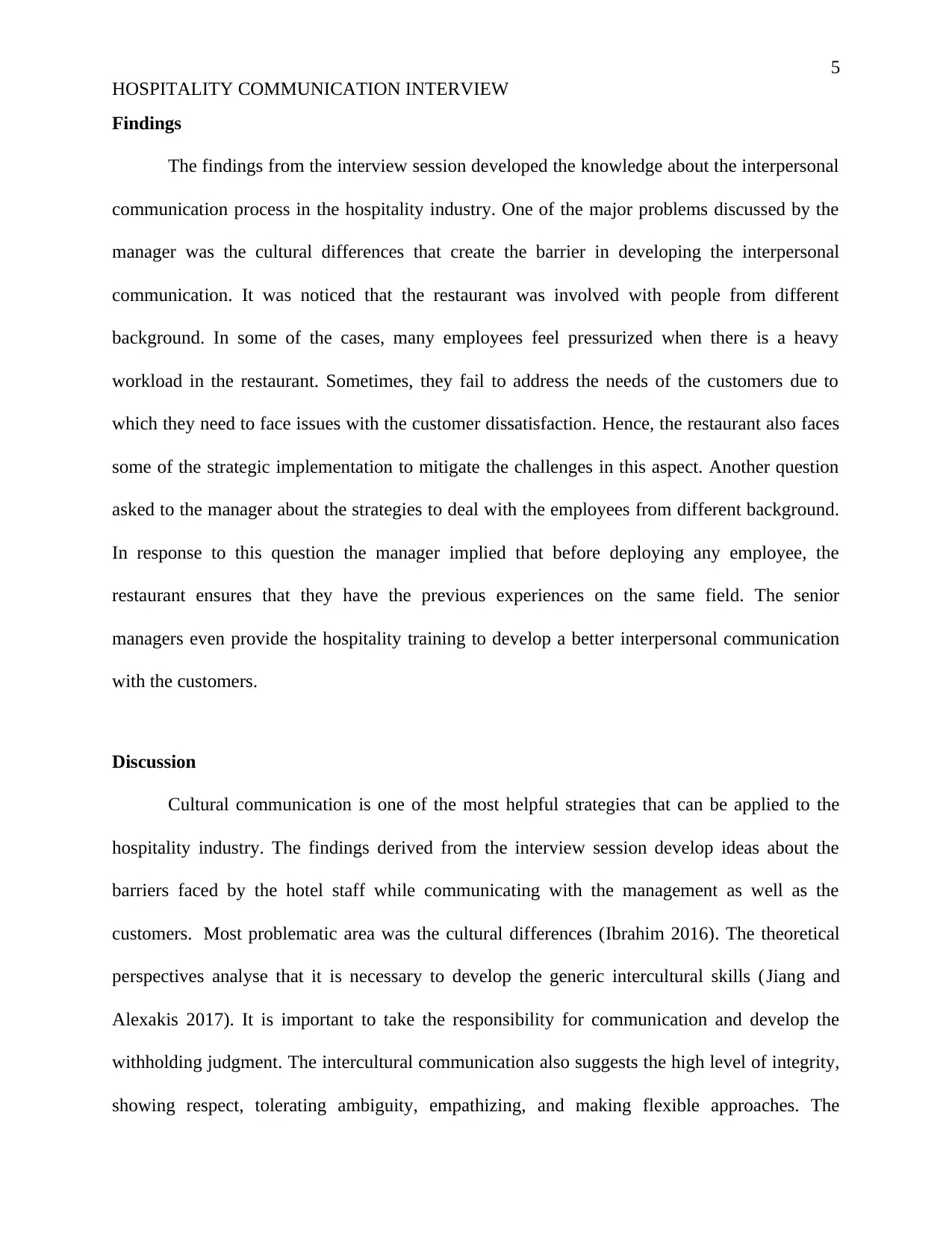
5
HOSPITALITY COMMUNICATION INTERVIEW
Findings
The findings from the interview session developed the knowledge about the interpersonal
communication process in the hospitality industry. One of the major problems discussed by the
manager was the cultural differences that create the barrier in developing the interpersonal
communication. It was noticed that the restaurant was involved with people from different
background. In some of the cases, many employees feel pressurized when there is a heavy
workload in the restaurant. Sometimes, they fail to address the needs of the customers due to
which they need to face issues with the customer dissatisfaction. Hence, the restaurant also faces
some of the strategic implementation to mitigate the challenges in this aspect. Another question
asked to the manager about the strategies to deal with the employees from different background.
In response to this question the manager implied that before deploying any employee, the
restaurant ensures that they have the previous experiences on the same field. The senior
managers even provide the hospitality training to develop a better interpersonal communication
with the customers.
Discussion
Cultural communication is one of the most helpful strategies that can be applied to the
hospitality industry. The findings derived from the interview session develop ideas about the
barriers faced by the hotel staff while communicating with the management as well as the
customers. Most problematic area was the cultural differences (Ibrahim 2016). The theoretical
perspectives analyse that it is necessary to develop the generic intercultural skills (Jiang and
Alexakis 2017). It is important to take the responsibility for communication and develop the
withholding judgment. The intercultural communication also suggests the high level of integrity,
showing respect, tolerating ambiguity, empathizing, and making flexible approaches. The
HOSPITALITY COMMUNICATION INTERVIEW
Findings
The findings from the interview session developed the knowledge about the interpersonal
communication process in the hospitality industry. One of the major problems discussed by the
manager was the cultural differences that create the barrier in developing the interpersonal
communication. It was noticed that the restaurant was involved with people from different
background. In some of the cases, many employees feel pressurized when there is a heavy
workload in the restaurant. Sometimes, they fail to address the needs of the customers due to
which they need to face issues with the customer dissatisfaction. Hence, the restaurant also faces
some of the strategic implementation to mitigate the challenges in this aspect. Another question
asked to the manager about the strategies to deal with the employees from different background.
In response to this question the manager implied that before deploying any employee, the
restaurant ensures that they have the previous experiences on the same field. The senior
managers even provide the hospitality training to develop a better interpersonal communication
with the customers.
Discussion
Cultural communication is one of the most helpful strategies that can be applied to the
hospitality industry. The findings derived from the interview session develop ideas about the
barriers faced by the hotel staff while communicating with the management as well as the
customers. Most problematic area was the cultural differences (Ibrahim 2016). The theoretical
perspectives analyse that it is necessary to develop the generic intercultural skills (Jiang and
Alexakis 2017). It is important to take the responsibility for communication and develop the
withholding judgment. The intercultural communication also suggests the high level of integrity,
showing respect, tolerating ambiguity, empathizing, and making flexible approaches. The
⊘ This is a preview!⊘
Do you want full access?
Subscribe today to unlock all pages.

Trusted by 1+ million students worldwide
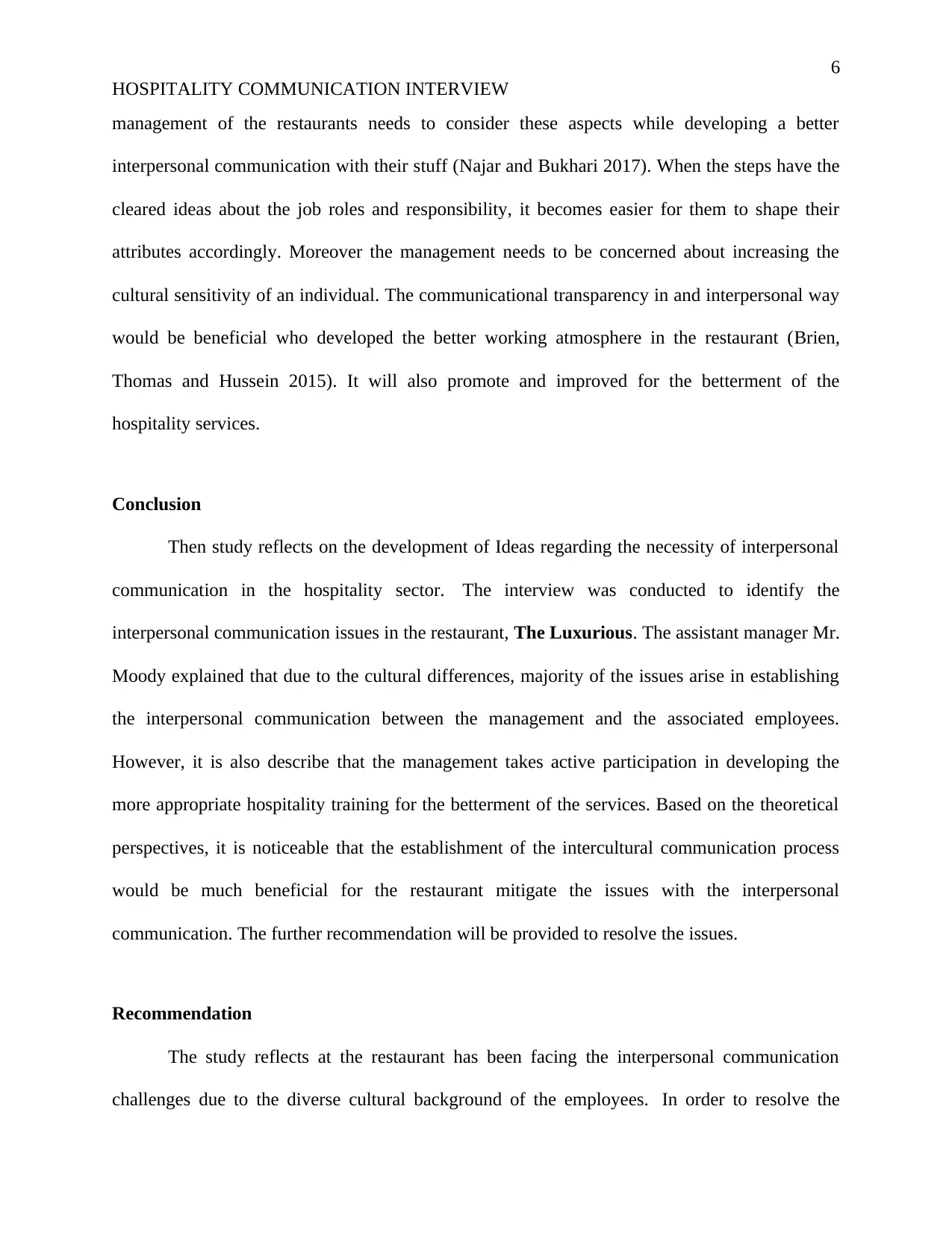
6
HOSPITALITY COMMUNICATION INTERVIEW
management of the restaurants needs to consider these aspects while developing a better
interpersonal communication with their stuff (Najar and Bukhari 2017). When the steps have the
cleared ideas about the job roles and responsibility, it becomes easier for them to shape their
attributes accordingly. Moreover the management needs to be concerned about increasing the
cultural sensitivity of an individual. The communicational transparency in and interpersonal way
would be beneficial who developed the better working atmosphere in the restaurant (Brien,
Thomas and Hussein 2015). It will also promote and improved for the betterment of the
hospitality services.
Conclusion
Then study reflects on the development of Ideas regarding the necessity of interpersonal
communication in the hospitality sector. The interview was conducted to identify the
interpersonal communication issues in the restaurant, The Luxurious. The assistant manager Mr.
Moody explained that due to the cultural differences, majority of the issues arise in establishing
the interpersonal communication between the management and the associated employees.
However, it is also describe that the management takes active participation in developing the
more appropriate hospitality training for the betterment of the services. Based on the theoretical
perspectives, it is noticeable that the establishment of the intercultural communication process
would be much beneficial for the restaurant mitigate the issues with the interpersonal
communication. The further recommendation will be provided to resolve the issues.
Recommendation
The study reflects at the restaurant has been facing the interpersonal communication
challenges due to the diverse cultural background of the employees. In order to resolve the
HOSPITALITY COMMUNICATION INTERVIEW
management of the restaurants needs to consider these aspects while developing a better
interpersonal communication with their stuff (Najar and Bukhari 2017). When the steps have the
cleared ideas about the job roles and responsibility, it becomes easier for them to shape their
attributes accordingly. Moreover the management needs to be concerned about increasing the
cultural sensitivity of an individual. The communicational transparency in and interpersonal way
would be beneficial who developed the better working atmosphere in the restaurant (Brien,
Thomas and Hussein 2015). It will also promote and improved for the betterment of the
hospitality services.
Conclusion
Then study reflects on the development of Ideas regarding the necessity of interpersonal
communication in the hospitality sector. The interview was conducted to identify the
interpersonal communication issues in the restaurant, The Luxurious. The assistant manager Mr.
Moody explained that due to the cultural differences, majority of the issues arise in establishing
the interpersonal communication between the management and the associated employees.
However, it is also describe that the management takes active participation in developing the
more appropriate hospitality training for the betterment of the services. Based on the theoretical
perspectives, it is noticeable that the establishment of the intercultural communication process
would be much beneficial for the restaurant mitigate the issues with the interpersonal
communication. The further recommendation will be provided to resolve the issues.
Recommendation
The study reflects at the restaurant has been facing the interpersonal communication
challenges due to the diverse cultural background of the employees. In order to resolve the
Paraphrase This Document
Need a fresh take? Get an instant paraphrase of this document with our AI Paraphraser
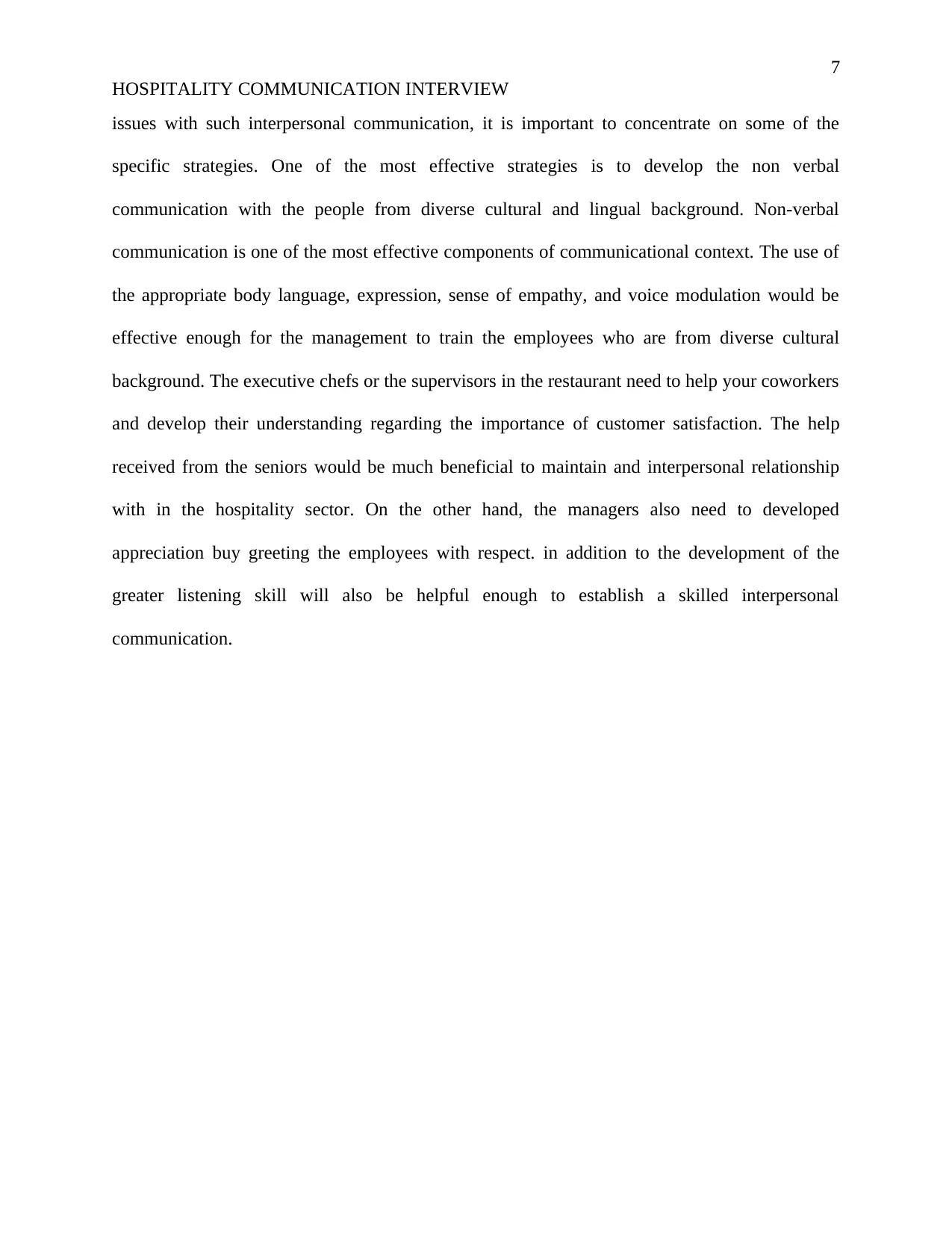
7
HOSPITALITY COMMUNICATION INTERVIEW
issues with such interpersonal communication, it is important to concentrate on some of the
specific strategies. One of the most effective strategies is to develop the non verbal
communication with the people from diverse cultural and lingual background. Non-verbal
communication is one of the most effective components of communicational context. The use of
the appropriate body language, expression, sense of empathy, and voice modulation would be
effective enough for the management to train the employees who are from diverse cultural
background. The executive chefs or the supervisors in the restaurant need to help your coworkers
and develop their understanding regarding the importance of customer satisfaction. The help
received from the seniors would be much beneficial to maintain and interpersonal relationship
with in the hospitality sector. On the other hand, the managers also need to developed
appreciation buy greeting the employees with respect. in addition to the development of the
greater listening skill will also be helpful enough to establish a skilled interpersonal
communication.
HOSPITALITY COMMUNICATION INTERVIEW
issues with such interpersonal communication, it is important to concentrate on some of the
specific strategies. One of the most effective strategies is to develop the non verbal
communication with the people from diverse cultural and lingual background. Non-verbal
communication is one of the most effective components of communicational context. The use of
the appropriate body language, expression, sense of empathy, and voice modulation would be
effective enough for the management to train the employees who are from diverse cultural
background. The executive chefs or the supervisors in the restaurant need to help your coworkers
and develop their understanding regarding the importance of customer satisfaction. The help
received from the seniors would be much beneficial to maintain and interpersonal relationship
with in the hospitality sector. On the other hand, the managers also need to developed
appreciation buy greeting the employees with respect. in addition to the development of the
greater listening skill will also be helpful enough to establish a skilled interpersonal
communication.
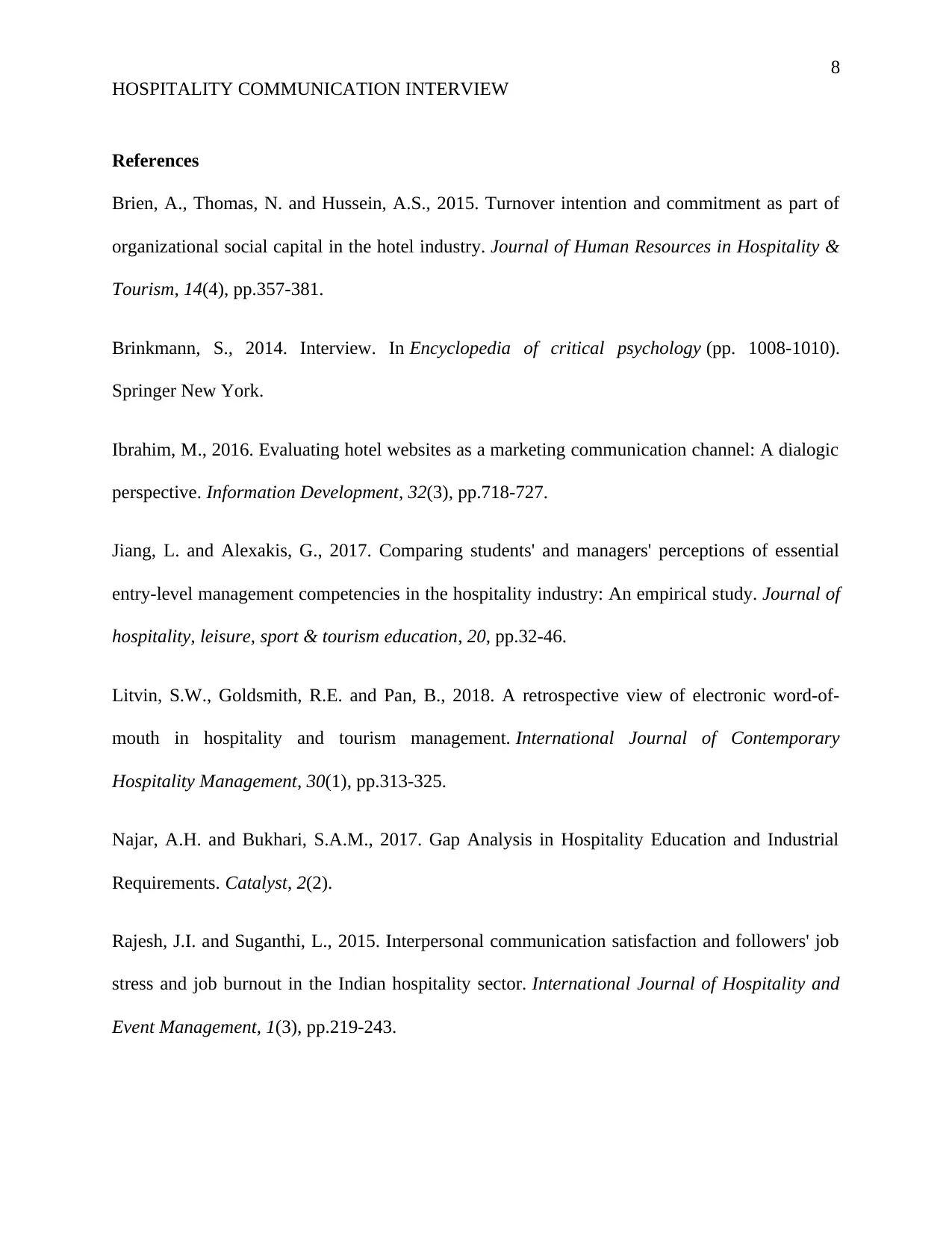
8
HOSPITALITY COMMUNICATION INTERVIEW
References
Brien, A., Thomas, N. and Hussein, A.S., 2015. Turnover intention and commitment as part of
organizational social capital in the hotel industry. Journal of Human Resources in Hospitality &
Tourism, 14(4), pp.357-381.
Brinkmann, S., 2014. Interview. In Encyclopedia of critical psychology (pp. 1008-1010).
Springer New York.
Ibrahim, M., 2016. Evaluating hotel websites as a marketing communication channel: A dialogic
perspective. Information Development, 32(3), pp.718-727.
Jiang, L. and Alexakis, G., 2017. Comparing students' and managers' perceptions of essential
entry-level management competencies in the hospitality industry: An empirical study. Journal of
hospitality, leisure, sport & tourism education, 20, pp.32-46.
Litvin, S.W., Goldsmith, R.E. and Pan, B., 2018. A retrospective view of electronic word-of-
mouth in hospitality and tourism management. International Journal of Contemporary
Hospitality Management, 30(1), pp.313-325.
Najar, A.H. and Bukhari, S.A.M., 2017. Gap Analysis in Hospitality Education and Industrial
Requirements. Catalyst, 2(2).
Rajesh, J.I. and Suganthi, L., 2015. Interpersonal communication satisfaction and followers' job
stress and job burnout in the Indian hospitality sector. International Journal of Hospitality and
Event Management, 1(3), pp.219-243.
HOSPITALITY COMMUNICATION INTERVIEW
References
Brien, A., Thomas, N. and Hussein, A.S., 2015. Turnover intention and commitment as part of
organizational social capital in the hotel industry. Journal of Human Resources in Hospitality &
Tourism, 14(4), pp.357-381.
Brinkmann, S., 2014. Interview. In Encyclopedia of critical psychology (pp. 1008-1010).
Springer New York.
Ibrahim, M., 2016. Evaluating hotel websites as a marketing communication channel: A dialogic
perspective. Information Development, 32(3), pp.718-727.
Jiang, L. and Alexakis, G., 2017. Comparing students' and managers' perceptions of essential
entry-level management competencies in the hospitality industry: An empirical study. Journal of
hospitality, leisure, sport & tourism education, 20, pp.32-46.
Litvin, S.W., Goldsmith, R.E. and Pan, B., 2018. A retrospective view of electronic word-of-
mouth in hospitality and tourism management. International Journal of Contemporary
Hospitality Management, 30(1), pp.313-325.
Najar, A.H. and Bukhari, S.A.M., 2017. Gap Analysis in Hospitality Education and Industrial
Requirements. Catalyst, 2(2).
Rajesh, J.I. and Suganthi, L., 2015. Interpersonal communication satisfaction and followers' job
stress and job burnout in the Indian hospitality sector. International Journal of Hospitality and
Event Management, 1(3), pp.219-243.
⊘ This is a preview!⊘
Do you want full access?
Subscribe today to unlock all pages.

Trusted by 1+ million students worldwide
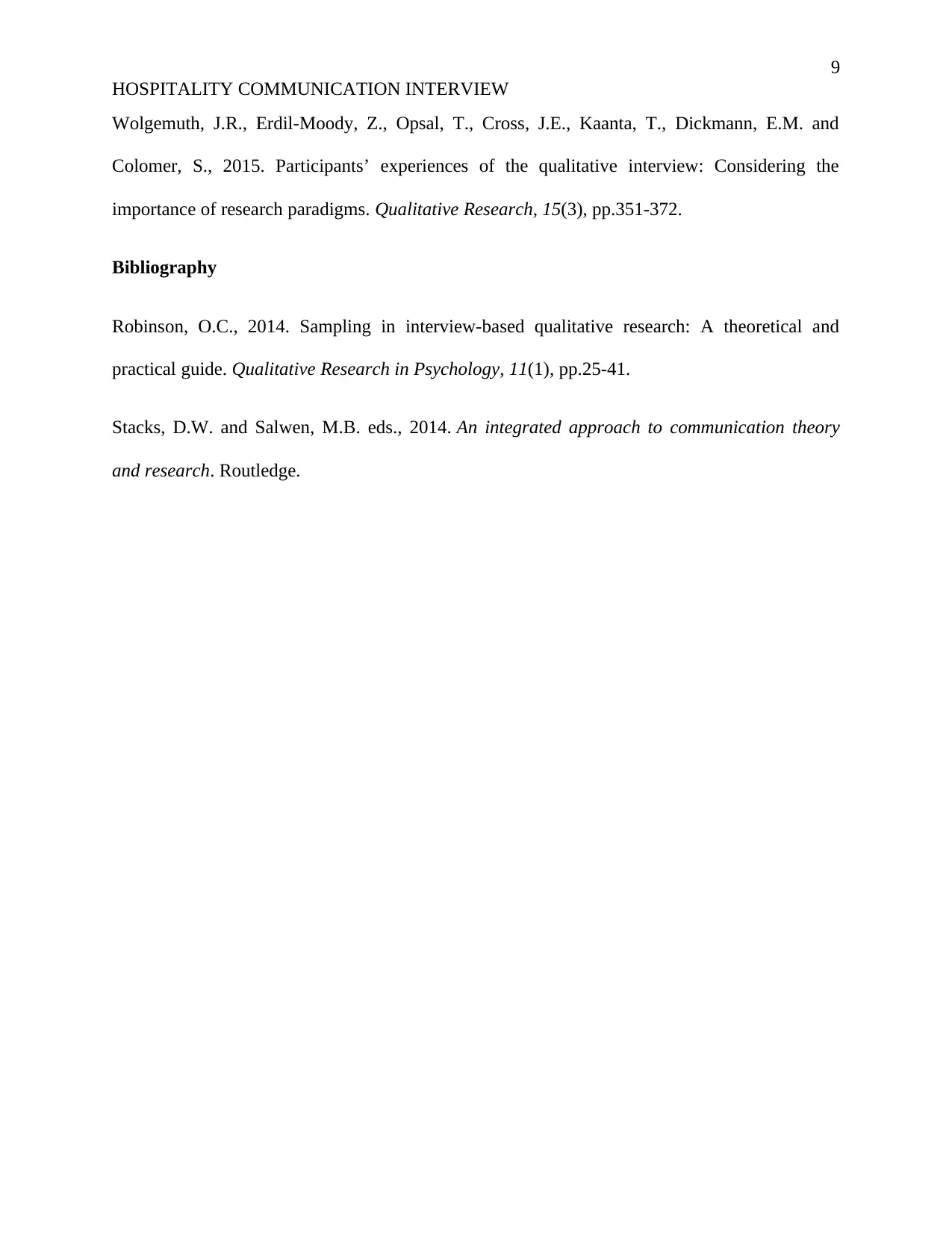
9
HOSPITALITY COMMUNICATION INTERVIEW
Wolgemuth, J.R., Erdil-Moody, Z., Opsal, T., Cross, J.E., Kaanta, T., Dickmann, E.M. and
Colomer, S., 2015. Participants’ experiences of the qualitative interview: Considering the
importance of research paradigms. Qualitative Research, 15(3), pp.351-372.
Bibliography
Robinson, O.C., 2014. Sampling in interview-based qualitative research: A theoretical and
practical guide. Qualitative Research in Psychology, 11(1), pp.25-41.
Stacks, D.W. and Salwen, M.B. eds., 2014. An integrated approach to communication theory
and research. Routledge.
HOSPITALITY COMMUNICATION INTERVIEW
Wolgemuth, J.R., Erdil-Moody, Z., Opsal, T., Cross, J.E., Kaanta, T., Dickmann, E.M. and
Colomer, S., 2015. Participants’ experiences of the qualitative interview: Considering the
importance of research paradigms. Qualitative Research, 15(3), pp.351-372.
Bibliography
Robinson, O.C., 2014. Sampling in interview-based qualitative research: A theoretical and
practical guide. Qualitative Research in Psychology, 11(1), pp.25-41.
Stacks, D.W. and Salwen, M.B. eds., 2014. An integrated approach to communication theory
and research. Routledge.
1 out of 10
Related Documents
Your All-in-One AI-Powered Toolkit for Academic Success.
+13062052269
info@desklib.com
Available 24*7 on WhatsApp / Email
![[object Object]](/_next/static/media/star-bottom.7253800d.svg)
Unlock your academic potential
Copyright © 2020–2026 A2Z Services. All Rights Reserved. Developed and managed by ZUCOL.





